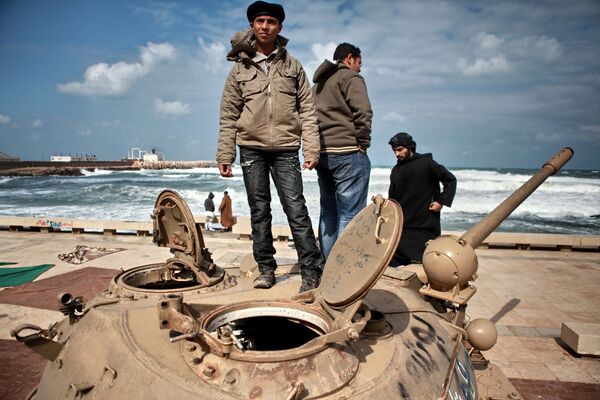The revolution in Libya that is in currently in full swing is holding the world’s attention. Leaders of major countries have condemned Col. Muammar Gaddafi, but the Libyan leader has no intentions of resigning yet. Many experts assert that Libya is on the verge of a civil war and Gaddafi is doomed to lose his power sooner or later. Professor Vitaly Naumkin, director for the Institute of Oriental Studies, shares his views on the latest events in Libya and makes his predictions on what these ongoing revolutionary processes in the Arab world may lead to.
Samir Sakhbaz: Mr. Naumkin hello and welcome. Do you believe that what we are witnessing right now in Libya is really a so-called people’s revolution or is it being orchestrated from abroad?
Vitaly Naumkin: No, I don’t think it was orchestrated from abroad, I think it is a genuine revolution. Whatever we call it – revolution, rebellion, it is a popular move, and it hasn’t been orchestrated from abroad. I believe that it hasn’t been orchestrated at all, because it is a genuine movement from the bottom to the top, a so-called bottom-top type of movement.
S.S.: So the people who are at the bottom they are finally tired. Why today? Why not last year? Because I think they lived as bad last year, too.
V.N.: The same happened to the Tunisians and to the Egyptians. I think the impact of the Egyptian events was very big. Because what usually happens in Egypt happens in a lot of places over the Arab world. It was always the leading country and it was always giving examples to the others.
S.S.: And in Egypt it was a people’s revolution also?
V.N.: I think in Egypt there were probably some elements of orchestration, if not from abroad but at least from some well-organized groups probably inside of Egypt. I won’t subscribe to any conspiracy theory because I believe that all these movements are locally oriented and locally motivated but in Libya there is clear influence of the Egyptian revolution.
S.S.: How do you evaluate the way Gaddafi is managing the situation? Is he in control?
V.N.: No, I think he is not in control of himself, first of all. Because he has clearly lost any control of himself because it is real shame to kill his own people, to use heavy artillery and other weapons. It is a crime. And calling for all these African mercenaries – it is also another crime against his own people. If he is a real Bedouin revolutionary as he has been always calling himself, it is a real shame for such a man to do these ugly things.
S.S.: How long do you think he can remain in power? A few days, weeks?
V.N.: You can never predict events in the Middle East because it is a very unpredictable region in general. Given the resources Gaddafi has, it might happen that he can last for some period of time, but I’m absolutely sure that he is doomed and that he will lose very soon. The most probable scenario is that he will fail very soon in a very bad manner. There is a real hatred all over the Arab world against Gaddafi; nobody is supporting him except some of his tribes, some of his entourage inside the regime and some people who just benefit from his position.
S.S.: Well, ok. Gaddafi is gone, if not today, then tomorrow. But some experts they expect that the country is on the verge of a civil war. Is it a possible scenario? For example, Gaddafi leaves probably for Venezuela or somewhere else, is there a danger of a civil war in this case?
V.N.: There is a danger, but I wouldn’t exaggerate the danger of a civil war because there are enough supporters of this popular movement against Gaddafi inside Tripolitania, because as we all know Libya historically consists of three regions - Fezzan, Cyrenaica and Tripolitania. Tripolitania normally has been supporting Gaddafi. And the popular base for the former King was mainly the eastern province in the former Cyrenaica, but as we can see now the people, and many of them in Tripolitania, are really against Gaddafi. So a possible split in Libya, a possible civil war cannot be excluded, but I believe that the unity of this country can be preserved and the people can unify.
S.S.: Is the revolution in Libya the last revolution in the Middle East or some other countries may become a victim of these events. Some predict that this wake will spread to the Middle East, Iran, Central Asia and even to the Caucasus, in southern Russia.
In general, I am against looking at the Middle East as it is a horserace, making a bid who is the next one. I am against it. I think there are regimes, states, nations and I hope that they will avoid the destiny of the fallen regimes. But it is absolutely necessary for the rulers of the rest of the states starting from Yemen to some other states to start reforms that can improve the social-economic and political situation in their countries in order to make people feel free and equal and to give them more opportunities to be represented in power and in public life.
S.S.: So there is room for optimism?
V.N.: There is some limited room for optimism. In general I am optimistic; I believe that the Arab nation is a great civilization and it has a lot of potential to develop and to make this transformation to the best in their history.
S.S.: That’s a good point to end our discussion. Thank you for your time and comments.

